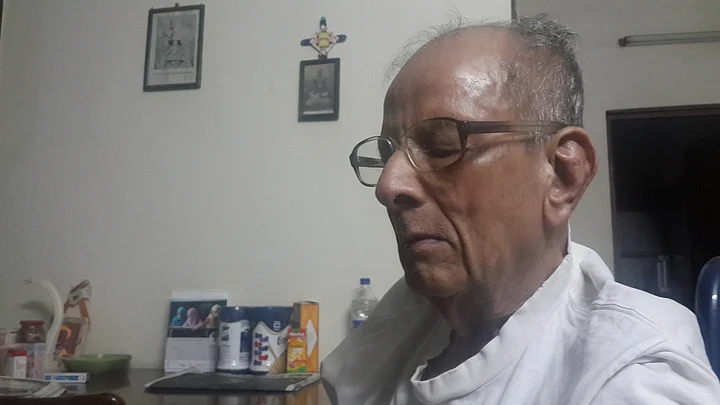Saturday night was a bad night for Anna. He was agitated all night. Trying to get up off the bed by himself. Insisting on walking (shuffling) around the house. Speaking in English. Looking for something or someone.
He finally went to sleep at around 4am. I was a little surprised to hear this, for Anna has been sitting with his eyes closed, whole body relaxed, doing a fabulous impersonation of Gautama Buddha.
On Sunday, Anna builds up enthusiasm to go to the mall for coffee and cake. I keep asking him about his dream, to determine why he was agitated. He just tells me that he does not remember.
Anna’s Bizarre Airport Dream
After our mandatory stop at Starbucks, he is wheeled around the mall while I shop. His attendant, Manish, takes a rest stop in front of a camel covered in flowers. Both Anna and Manish find it interesting.

Then on the way home, we have this conversation:
Anna: Were those real flowers on the camel?
Me: Yes Anna. I think so.
Anna: It must have been very expensive.
Me: Probably.
Anna: Last night I had a bad dream.
Me (suddenly realising that he, now, remembers his dream): Really? What happened in your dream?
Anna: I bought a shirt. It was really expensive.
Me (not understanding how buying a shirt can be a bad dream): Where did you buy the shirt, Anna?
Anna: At the airport.
Me: What were you doing at the airport?
Anna: Going to a wedding.
Ah! Now I understand. There is a definite connection between a marigold decked camel and a wedding.
This conversation goes on the entire journey home – about 40 minutes. All in question-answer mode.
Anna recounts his dream (hallucination) with a little encouragement from me, like asking, "And then what happened?", or "Really?", or simply saying, "Go on".
Here is the hallucination, using most of his original words:
Anna is at an airport. He decides to buy a shirt for a wedding. He chooses the older "model", as the latest "model" is very expensive. He unpacks and wears the shirt and then goes to pay for it. It is then that he realises that he has no "paper money" and no "plastic money" to pay for it. The cashier tells Anna that they will have to detain him overnight while he arranges for money to pay for it.
Anna searches his belongings and finds that he does not have any papers. He also does not remember our names, addresses, or numbers. He is panicking and the cashier keeps taunting Anna saying that all thieves pretend to have lost money and papers, and then claim not to remember their identity.

With superhuman effort, Anna taxes his brain. He remembers his "valet's" name, Manish. The cashier looks up Manish's contact details on the "address-0-gram" and calls Manish to bring money to the airport. Manish says he will take 1 hour 56 minutes precisely and he does.
At the end of this tale, I ask Anna if he is feeling calm now. He says "Of, course! It was just a dream".
I decide not to tell him that he hallucinated the whole airport shopping event last night and was agitated. He says that the worst part of his "dream" was the embarrassment of being called a thief and being threatened with detention.
The dream is over. He is calm now, and that is all that matters to us.
( (After working in corporate India for over 29 years, Sangeeta had taken time off to look after her father, who was diagnosed with Parkinson’s Disease in 2008 and passed away in 2017. Sangeeta hopes that these authentic stories will help patients and caregivers understand and appreciate the impact of Parkinson’s Disease. You can follow Sangeeta’s blog here.)
(This piece is being repubbed from FIT's archives to mark World Parkinson’s Day.)
Related Links in the Series:
My Anna Holds on to his Bata Sandals, Even as He Loses his Memory
Who Knew That Nutella Would Convince My Old Dad to Take his Pills?
For a Dad with Parkinson’s, I’d Get Him All the Junk Food He Wants
Pray, Why Does My 87-Year-Old Anna Need an Aadhaar Card?
When Anna Forgot the Words for Pain & Medicine & Suffered Quietly
A Dialogue: The Day I Saw My Dad For the Feminist That He Is
Why I’m Going to Research Organ & Body Donation For My Brave Anna
Despite Parkinson’s, Dad Lies at Attention for the National Anthem
(At The Quint, we are answerable only to our audience. Play an active role in shaping our journalism by becoming a member. Because the truth is worth it.)
